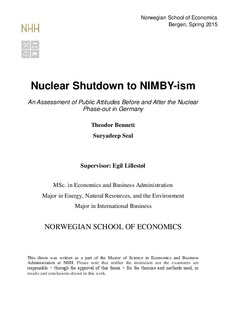| dc.description.abstract | The Merkel Government’s decision in 2011 to phase-out nuclear power in Germany by 2022 marked a seminal moment in German energy policy. The decision after the Fukushima Daiichi accident was a combination of a strong anti-nuclear movement and impending elections conducive to its realization. As much as mounting public pressure was pivotal in the nuclear shutdown, public acceptance has been equally important in subsequent implementation of the Energiewende. Public opposition to infrastructure projects needed to realize secure supply of energy, such as the expansion of the transmission grid and development of wind farms, has faced local opposition and been attributed to NIMBY (Not In My Backyard) behavior, opposed to a perceived decrease in aesthetic appeal, real estate value, and associated health costs. However, an analysis of research conducted on public opinions reflects that more than the largely localized NIMBY resistance, changes in affordability could have a greater impact on acceptance levels. Relative to nuclear, the System Levelized Costs of Energy and the inherent profile, balancing, and dispatchability costs are problematic for further renewable integration. Additionally, continually increasing domestic consumer prices and unequal distribution of the EEG surcharge could further augment public resistance.
The paper further compares public opinions before and after the nuclear phase-out. The anti-nuclear movement can be largely characterized as a NIABY (Not In Any Backyard) movement with collectively resonating norms against it. In contrast, public attitudes after the phase-out are a combination of NIMBY-ism and resistance to specific projects without rejecting the overarching principle as a whole reflected in a majority of the German public polling in favour of the Energiewende being relevant for the German population. Of importance also is the role of perceived justice and fairness and the lack thereof could also lower public acceptance, especially in terms of distribution of the costs of the Energiewende.
To this end, the paper concludes that while not currently of a scale comparable to the anti-nuclear movement, public opinions must nonetheless be engaged by the Government through more transparent and collaborative decision making processes. While the German government is taking steps towards including the public more, most of its plans are still nascent and their efficacy remains to be assessed after they are implemented. | nb_NO |
